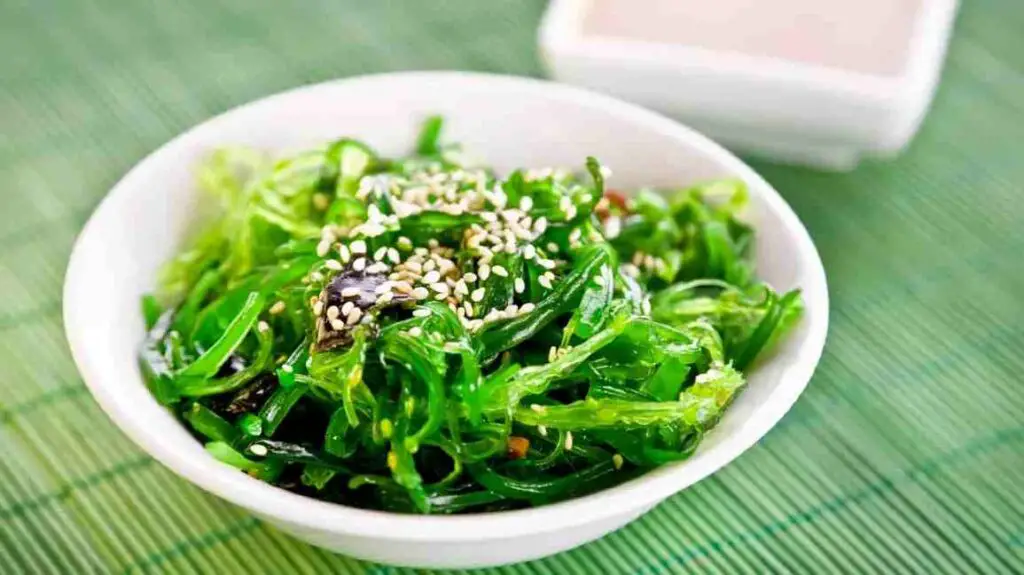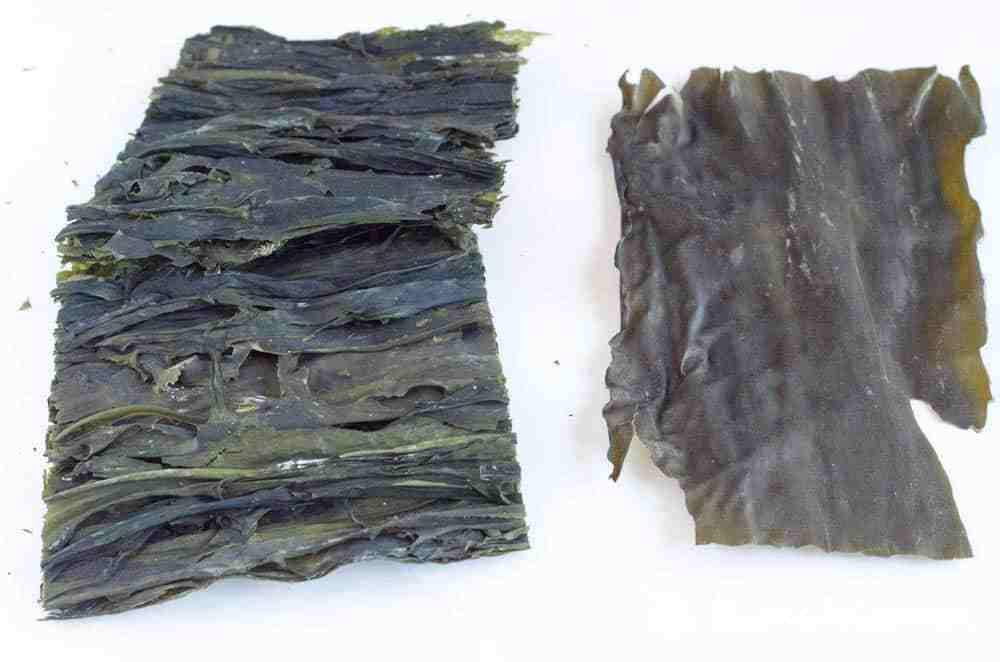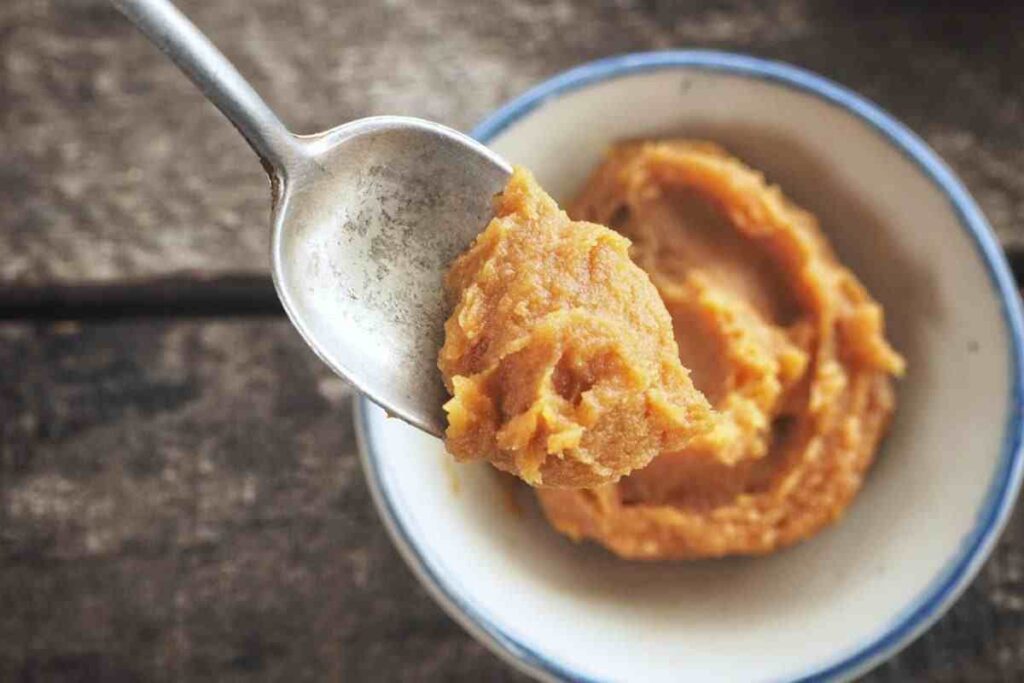Imagine walking along the rugged coastline, the salty sea breeze in your hair, the roar of the waves crashing against the rocks. You look down and see a thick, green, leafy plant swaying with the ebb and flow of the tide. This is kelp, a type of seaweed that thrives in the nutrient-rich, cold waters of the ocean. Kelp is not just a simple plant; it’s a powerhouse of nutrients and has been a staple in the diets of coastal communities for centuries. But the question arises, ‘Is kelp safe to take daily?’ This blog will dive into the depths of the ocean to unravel the mystery of kelp, its benefits, potential risks, and the recommended daily intake. So, let’s embark on this exciting journey together!
What is Kelp?

Kelp, also known as Laminariales, is a type of brown algae that grows as large coastal seaweeds in colder seas. There are about 30 different genera of kelp. Despite its plant-like appearance, kelp is not a plant but a stramenopile, a group containing many protists.
SHOP FOR THE KELP SUPPLEMENT ON AMAZON
Kelp grows in “underwater forests” in shallow oceans and is thought to have appeared in the Miocene, 5 to 23 million years ago. These underwater towers of kelp provide food and shelter for thousands of fish, invertebrates, and marine mammal species. Kelp forests foster a huge and diverse amount of life, including sea snails, brittle stars, lobsters, various species of fish, seals, sea otters, and more.
Kelp is known for its high growth rate—the genera Macrocystis and Nereocystis can grow as fast as half a meter a day, ultimately reaching 30 to 80 meters (100 to 260 ft). It’s also an important source of a complex carbohydrate known as algin, which is useful in various industrial processes.
In terms of structure, most kelp consists of flat or leaf-like structures known as blades. Blades originate from elongated stem-like structures, the stipes. The holdfast, a root-like structure, anchors the kelp to the substrate of the ocean.
Nutritional Benefits of Kelp
Kelp is a nutritional powerhouse packed with vitamins, minerals like iodine, and antioxidants. Here are some of the key nutritional benefits of kelp:
1. Rich Source of Vitamins and Minerals: Kelp absorbs nutrients from its surrounding marine environment, making it rich in vitamins, minerals, and trace elements. It contains the following vitamins and minerals:
- Vitamin K1: 55 percent of the daily value (DV)
- Folate: 45 percent of the DV
- Magnesium: 29 percent of the DV
- Iron: 16 percent of the DV
- Vitamin A: 13 percent of the DV
- Pantothenic acid: 13 percent of the DV
- Calcium: 13 percent of the DV
2. Iodine Content: Kelp is one of the best natural food sources of iodine, an essential component in thyroid hormone production. Low iodine levels can lead to metabolism disruption and thyroid gland enlargement.
3. Antioxidant Properties: Kelp is high in antioxidants, including carotenoids and flavonoids, which help fight against disease-causing free radicals. Antioxidant minerals, such as manganese and zinc, help combat oxidative stress and may help protect cardiovascular health and prevent cancer.
4. Disease Prevention: Including antioxidant-rich food in the diet may help prevent many chronic diseases. Kelp’s high antioxidant content can help in this regard.
5. Weight Loss: Kelp may even reduce fat absorption in the gut, aiding in weight loss.
SHOP FOR THE KELP POWDER ON AMAZON
Remember, while kelp is generally safe to consume in food amounts, it can be harmful if consumed in excess, especially in supplement form. Always consult with a healthcare provider before starting any new supplement regimen.
Health Benefits of Kelp
Kelp, a type of brown algae, is known for its numerous health benefits. Here are some of the key health benefits of kelp:

- Prevention of Cancer: Kelp is high in antioxidants, including carotenoids and flavonoids, which help fight against disease-causing free radicals. Antioxidant minerals, such as manganese and zinc, help combat oxidative stress and may help protect cardiovascular health and prevent cancer.
- Promotion of Cardiovascular Health: The antioxidants in kelp not only help prevent cancer but also promote cardiovascular health.
- Aid in Weight Loss: Kelp may even reduce fat absorption in the gut, aiding in weight loss.
- Boosting Energy Levels and Brain Function: Kelp can raise energy levels and boost brain function.
- Diabetes Control: Kelp contains a mineral called vanadium that could help people with Type 2 diabetes. Early studies using animals and humans have shown that it can help regulate blood sugar.
- Prevention of Anemia: Kelp is moderately rich in iron, which is necessary to prevent the iron deficiency known as anemia.
- Thyroid Health: Your thyroid requires iodine to function properly. Your body does not manufacture iodine, so it’s important to get it through your diet. If you don’t have enough iodine, your thyroid won’t produce enough hormones, which can lead to hypothyroidism. Kelp is a great source of iodine and can help maintain a healthy thyroid.
Remember, while kelp has many potential health benefits, it’s important to consume it in moderation.
Risks and Side Effects of Kelp
While kelp is generally safe to consume in food amounts, it can be harmful if consumed in excess, especially in supplement form. Here are some potential risks and side effects of consuming kelp:
- Excess Iodine: Kelp is a rich source of iodine. While iodine is essential for thyroid hormone production, too much iodine can lead to both hyperthyroidism and hypothyroidism. An extended period of thyroid dysfunction has been linked directly to too much use of kelp supplements.
- Risk of Heavy Metal Poisoning: Kelp may contain harmful metals, such as cadmium, lead, aluminum, and other heavy metals. These metals are absorbed from the ocean and can pose health risks when consumed in large amounts.
- Inaccurate Food Labeling: There’s also a risk of inaccurate food labeling when it comes to kelp supplements. This could lead to unintentional overconsumption of iodine or heavy metals.
Always consult with a healthcare provider before starting any new supplement regimen, especially if you have a pre-existing medical condition or are taking other medications. It’s also important to purchase supplements from reputable sources to minimize the risk of contamination.
Who Should Avoid Kelp
Certain individuals should avoid consuming kelp. These include:
- People with iodine sensitivity or hyperthyroidism: Kelp is rich in iodine, and excessive iodine intake can be harmful, particularly for individuals with iodine sensitivity or those who suffer from hyperthyroidism. Too much iodine can exacerbate thyroid issues.
- People with hypothyroidism: While iodine is essential for thyroid function, individuals with hypothyroidism (underactive thyroid) may need to monitor their iodine intake. Consuming excessive amounts of iodine can interfere with thyroid hormone production.
- Pregnant and breastfeeding women: Excessive iodine intake during pregnancy can negatively impact fetal development. Pregnant and breastfeeding women should consult with their healthcare provider to determine the appropriate amount of iodine needed for their specific situation.
- People with kidney problems: Kelp contains high levels of potassium, and individuals with kidney problems may need to limit their potassium intake. Excessive potassium levels can be harmful to individuals with compromised kidney function.
- People taking certain medications: Some medications, such as blood thinners or medications for thyroid disorders, may interact with the iodine or other components in kelp. Individuals on medication need to consult their healthcare provider before adding kelp to their diet.
- Those with seafood allergies: Although kelp is not a fish or shellfish, individuals with seafood allergies may still want to exercise caution and consult with their healthcare provider before trying kelp, as cross-contamination or sensitivities can occur.
- Children: Due to the concentrated nature of some kelp supplements, they may not be suitable for children. Children generally have lower iodine requirements than adults, and excessive intake can be harmful.
It’s crucial for individuals in these groups to consult with their healthcare providers before incorporating kelp into their diets or taking kelp supplements.
Recommended Daily Intake of Kelp
The recommended daily intake of kelp can vary depending on the individual and the form it consumes. Here are some general guidelines:
- Iodine Intake: Most adults need 150 micrograms of iodine per day. The upper limit (the most that should be consumed in a day) is 1,100 micrograms.
- Kelp Supplements: For an under-active thyroid, it is recommended that a person take a maximum of 600 mg of kelp supplements daily. Since different kelp varieties contain different levels of iodine, the US law sets a limit of 225 mcg of iodine to be provided by a single kelp supplement.
- No Official Guidelines: At present, there are no official recommended daily dosage guidelines in place for kelp.
Remember, while kelp is generally safe to consume in food amounts, it can be harmful if consumed in excess, especially in supplement form.
Does Dried Kelp Go Bad?

Dried kelp is shelf-stable and can last for several months or even years, depending on the packaging. However, it’s important to store it properly to maintain its quality. Here are some storage tips:
- Keep it dry: Moisture can cause dried seaweed to lose its crispness and become stale.
- Use an airtight container: Oxygen can cause dried seaweed to lose its crispness and become stale.
- Avoid sunlight: Exposure to sunlight can degrade the quality of dried seaweed.
Is It Safe to Eat Gelatin Everyday?
If your dried kelp starts to smell fishy or sour, it has probably gone bad. The kelp will also be slimy and have a greenish-black color. Always check the packaging label for storage instructions and expiration dates, and keep the seaweed in an airtight container. Remember, proper storage is key to maintaining the flavor and nutritional value of dried kelp.
FAQs
Q. 1 What is the difference between kelp and seaweed?
Ans. Kelp and seaweed are both marine algae species. However, kelp is a subspecies of seaweed. This means all kelp is seaweed, but not all seaweed is kelp. The key differences between kelp and seaweed are their habitat, size, color, and uses.
Q. 2 What are some popular dishes that use kelp?
Ans. Kelp is used in a variety of dishes. Some popular ones include Wakame Gunkan Maki, a traditional Japanese type of sushi, Doenjang Jjigae, a traditional Korean stew, and Budae Jjigae, a Korean stew that combines kelp and anchovy stock with kimchi, baked beans, spam, and hot dog sausages.
Q 3. How does cooking affect the nutritional value of kelp?
Ans. Cooking can actually enhance the absorption of nutrients that are otherwise difficult for your body to process in a raw form. However, the nutritional value of kelp can also be affected by the cooking method and the other ingredients used in the dish.
Q 4. Can I grow kelp at home?
Ans. Kelp is typically grown in the ocean, in nutrient-rich, cold, rocky coastlines. While it’s possible to use kelp in home gardens as a fertilizer, growing kelp at home in a controlled environment would likely be challenging.
Q 5. What is the difference between kelp supplements and eating kelp in its natural form?
Ans. Kelp supplements are often used for their high source of iodine, a nutrient necessary for a healthy metabolism. On the other hand, raw kelp is farmed straight from the sea and consumed in its most natural form.
Q 6. Are there any interactions between kelp and medications?
Ans. Kelp could potentially interact with certain medications due to its high iodine content and other vitamins/minerals. These medications include thyroid medications (e.g., levothyroxine), anti-arrhythmic (e.g., digoxin due to the potassium content), and blood pressure medication.
Q 7. Is there a difference in nutritional value between different types of kelp?
Ans. The nutritional value can vary between different types of kelp. Factors such as size, growth location, and specific species characteristics can influence the levels of essential nutrients in different types of kelp.
Conclusion
In conclusion, kelp, a type of brown algae, is rich in vitamins, minerals, and antioxidants, offering numerous health benefits. However, it’s important to consume it in moderation due to potential risks such as excess iodine and heavy metal poisoning. Certain individuals, including those with thyroid conditions and pregnant women, should avoid kelp. Always consult with a healthcare provider before starting any new supplement regimen. Remember, when it comes to consuming kelp, moderation is key!

Good day, and welcome to Fitthour. My name is Shubham Vijay, and I am a certified personal trainer and nutrition coach with 6 years of experience in the fitness industry. At Fitthour, we specialize in types of training, such as strength training, cardio, or HIIT, and our mission is to help clients achieve their fitness goals and improve their overall health.




